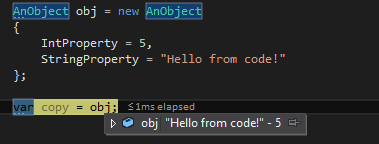DebuggerDisplay Attribute
suggest changeAdding the DebuggerDisplay Attribute will change the way the debugger displays the class when it is hovered over.
Expressions that are wrapped in {} will be evaluated by the debugger. This can be a simple property like in the following sample or more complex logic.
[DebuggerDisplay("{StringProperty} - {IntProperty}")]
public class AnObject
{
public int ObjectId { get; set; }
public string StringProperty { get; set; }
public int IntProperty { get; set; }
}
Adding ,nq before the closing bracket removes the quotes when outputting a string.
[DebuggerDisplay("{StringProperty,nq} - {IntProperty}")]Even though general expressions are allowed in the {} they are not recommended. The DebuggerDisplay attribute will be written into the assembly metadata as a string. Expressions in {} are not checked for validity. So a DebuggerDisplay attribute containing more complex logic than i.e. some simple arithmetic might work fine in C#, but the same expression evaluated in VB.NET will probably not be syntactically valid and produce an error while debugging.
A way to make DebuggerDisplay more language agnostic is to write the expression in a method or property and call it instead.
[DebuggerDisplay("{DebuggerDisplay(),nq}")]
public class AnObject
{
public int ObjectId { get; set; }
public string StringProperty { get; set; }
public int IntProperty { get; set; }
private string DebuggerDisplay()
{
return $"{StringProperty} - {IntProperty}"";
}
}One might want DebuggerDisplayto output all or just some of the properties and when debugging and inspecting also the type of the object.
The example below also surrounds the helper method with #if DEBUG as DebuggerDisplay is used in debugging environments.
[DebuggerDisplay("{DebuggerDisplay(),nq}")]
public class AnObject
{
public int ObjectId { get; set; }
public string StringProperty { get; set; }
public int IntProperty { get; set; }
#if DEBUG
private string DebuggerDisplay()
{
return
$"ObjectId:{this.ObjectId}, StringProperty:{this.StringProperty}, Type:{this.GetType()}";
}
#endif
}